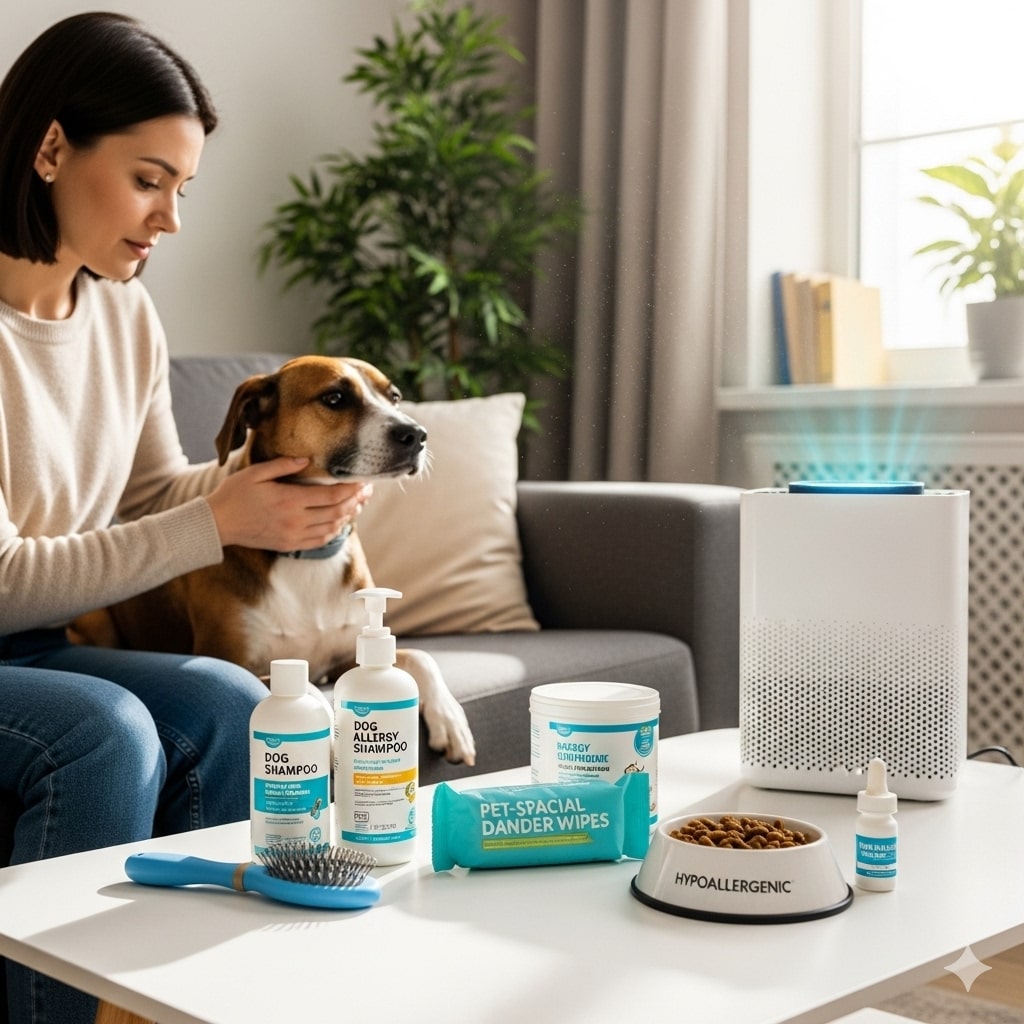Home Remedies for Dog Allergies: Safe and Natural Solutions
Allergies in dogs are more common than many pet owners realize. From itchy skin and constant scratching to watery eyes and sneezing, dog allergies can be frustrating for both pets and their humans. While professional veterinary care is always recommended for severe cases, many mild to moderate allergy symptoms can be managed at home with natural remedies, lifestyle adjustments, and careful observation.
In this detailed guide, we’ll cover everything you need to know about managing dog allergies at home—from identifying the triggers to natural remedies, grooming tips, diet strategies, and when to seek veterinary help.
Discover More: Puppy Crate Training for Beginners: The Ultimate Guide

Discover More: How to Potty Train a Puppy Fast: Complete Guideline
Chapter 1: Understanding Dog Allergies
What Are Dog Allergies?
Dog allergies occur when a dog’s immune system reacts abnormally to substances (allergens) that are usually harmless. These allergens may come from food, the environment, or even fleas.
Common Types of Dog Allergies
- Flea Allergy Dermatitis (FAD) – Caused by flea bites. Even one bite can trigger severe itching.
- Environmental Allergies (Atopy) – Triggered by pollen, mold, dust mites, or grass.
- Food Allergies – Reaction to certain proteins, grains, or additives.
- Contact Allergies – Caused by direct skin contact with irritants like shampoos, fabrics, or chemicals.
Symptoms of Allergies in Dogs
- Itchy skin (pruritus)
- Licking or chewing paws
- Red, inflamed skin or hot spots
- Ear infections or head shaking
- Watery eyes and sneezing
- Hair loss in patches
- Digestive issues (vomiting, diarrhea)
Chapter 2: Identifying the Source of Allergies
Before treating allergies at home, identifying the source is crucial.
Step 1: Keep an Allergy Diary
Track your dog’s symptoms, food intake, environmental changes, and seasons. Patterns often emerge.
Step 2: Elimination Diet
If food allergies are suspected, feed a limited-ingredient or hypoallergenic diet for 8–12 weeks.
Step 3: Rule Out Fleas
Use a flea comb, check bedding, and apply vet-recommended flea preventives.
Step 4: Consider Seasonal Changes
Dogs often suffer more during spring and fall when pollen counts are high.
Chapter 3: Home Remedies for Dog Allergies
1. Natural Skin Soothers
- Oatmeal Baths – Relieve itching and soothe inflamed skin.
- Coconut Oil – Apply topically for moisture and anti-inflammatory benefits.
- Aloe Vera (Dog-Safe) – Reduces redness and hot spots.
2. Dietary Support
- Omega-3 Fatty Acids (from fish oil) reduce inflammation.
- Probiotics support gut health and immunity.
- Limited-Ingredient Diets reduce allergic triggers.
3. Herbal Remedies
- Chamomile Tea Rinse – Natural anti-inflammatory.
- Green Tea Rinse – Helps with minor skin irritation.
4. Apple Cider Vinegar (Diluted)
Spray lightly on itchy areas (avoid open wounds). It has antibacterial and antifungal properties.
Chapter 4: Grooming & Cleaning Tips for Allergic Dogs
Bathing Routine
- Bathe once every 1–2 weeks using hypoallergenic dog shampoo.
- Avoid human shampoos—they disrupt skin pH.
Ear Cleaning
- Allergies often cause ear infections. Clean ears weekly with vet-approved solution.
Paw Care
- Wipe paws after outdoor walks to remove pollen and dust.
- Use paw balms for dryness and itching.
Bedding & Home Cleaning
- Wash bedding weekly in hot water.
- Vacuum carpets and sofas frequently.
- Use HEPA air purifiers to reduce allergens indoors.
Chapter 5: Diet & Nutrition for Allergy Relief
Best Dog Foods for Allergies
- Grain-Free Formulas (if grain is the culprit)
- Novel Proteins like duck, venison, or rabbit
- Hydrolyzed Protein Diets (recommended by vets)
Supplements That Help
- Fish oil
- Probiotics
- Quercetin (“natural antihistamine”)
- Vitamin E
Foods to Avoid
- Common allergens: beef, chicken, dairy, wheat, soy
- Artificial preservatives and colorings
Chapter 6: Preventing Allergic Reactions at Home
- Regular flea prevention (spot-on treatments, collars, oral meds)
- Keep windows closed during high pollen seasons
- Use hypoallergenic laundry detergent for dog bedding
- Limit outdoor walks during peak pollen hours
- Avoid smoking around pets
Chapter 7: Over-the-Counter & Vet-Approved Options
While managing at home, some medications may help:
- Antihistamines (Benadryl, Zyrtec) – Always ask your vet for dosage.
- Hydrocortisone Creams – For localized itching.
- Medicated Shampoos – For yeast or bacterial overgrowth.
Chapter 8: When to See a Veterinarian
Seek professional help if:
- Symptoms worsen despite home remedies
- Your dog has constant ear infections
- Severe hair loss or hot spots occur
- Difficulty breathing or swelling (possible emergency)
Chapter 9: Frequently Asked Questions (FAQs)
Q1. Can I give my dog human allergy medicine?
Only under veterinary guidance. Some human meds are toxic to dogs.
Q2. Do dogs outgrow allergies?
Most dogs don’t, but symptoms can be managed.
Q3. Are hypoallergenic breeds real?
No dog is truly hypoallergenic, but some shed less dander.
Q4. How long do allergy flare-ups last?
It depends on the trigger—seasonal allergies may last weeks.
Q5. Can stress worsen allergies in dogs?
Yes. Stress weakens immunity and increases flare-ups.
Chapter 10: Long-Term Allergy Management Plan
- Work with your vet to develop an allergy action plan.
- Stick to a consistent diet.
- Maintain flea and tick prevention.
- Schedule regular grooming.
- Keep your home allergen-free.
Conclusion
Managing dog allergies at home takes patience, consistency, and care. With natural remedies, the right diet, proper grooming, and environmental management, most dogs experience significant relief. Remember, home remedies work best for mild to moderate allergies. For severe or persistent symptoms, always consult your veterinarian.
By staying proactive, you can give your furry friend the comfortable, healthy life they deserve.
🐶NOTE:
This post is for informational purposes only. Please see our full Disclaimer Page for details.
